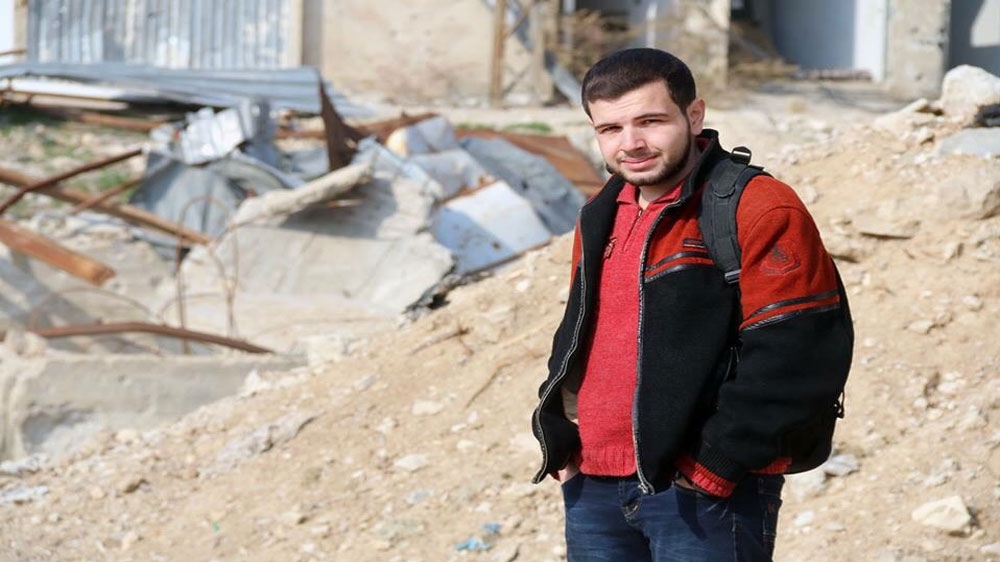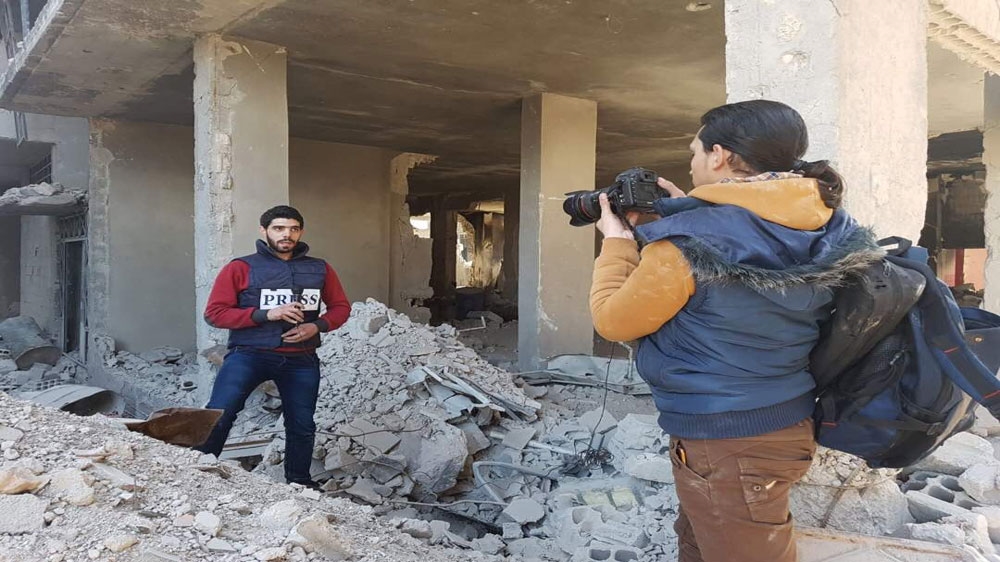Journalists in Eastern Ghouta: ‘No one likes to die silently’
Al Jazeera spoke to two journalists living in Eastern Ghouta about their experiences covering the air attacks.

Bombardment of Eastern Ghouta, the opposition-held enclave, over the past week has been one of the heaviest of Syria’s seven-year war, killing more than 550 people in eight days, according to a toll compiled by the Syrian Observatory for Human Rights, a UK-based war monitor.
Two journalists based in Ghouta spoke to Al Jazeera about their experiences covering the air attacks and what life under a government-imposed siege since 2013 is like.
Keep reading
list of 4 itemsPalestinian Prisoner’s Day: How many are still in Israeli detention?
‘Mama we’re dying’: Only able to hear her kids in Gaza in their final days
Europe pledges to boost aid to Sudan on unwelcome war anniversary
Ammar Al-Bushi, 24, photographer

I work as a freelance photographer with Anadolu Agency. I previously worked with Reuters back in 2013, in addition to Al Jazeera English, and then with a number of other news agencies around the world. I also volunteer with local networks in Eastern Ghouta.
I first started working as a photographer using my mobile phone. My brother and I transferred footage to media outlets of the peaceful protests in my town and the suppression of the demonstrators.
The goal has always been to give a voice to those who did not have one in Syria under the ruling Assad gang. As long as media workers are targeted by the regime, journalism is more difficult than military confrontation.
|
|
As journalists in the Eastern Ghouta, we did not have the opportunity to get training like in other Syrian areas because we are under a long siege. Therefore, our knowledge in journalism is limited to what we are able to access from the internet.
At the end of the day, a photographer is a human being. I cannot forget when a demonstrator with a banner calling for freedom was killed in front of my eyes. We may get used to death, bombing and bidding farewell to those we love, but the regime surprises us by painting new colours of death.
Being a journalist, I have been in a position where I photographed hundreds of dead children, as when the regime used chemical weapons on Eastern Ghouta in August 2013. I placed ice on their bodies and wrote numbers on their foreheads to document their deaths. You would think after that nothing on this Earth will be harder to witness, but then came the siege.
The world may not be affected by our sufferings, but ultimately no one likes to die silently.
Technical problems in Eastern Ghouta that we suffer prevents us from communicating with the outside world. We have difficulty sending videos abroad, as the 3G internet service is controlled by the government in many areas.
We also have the problem of electricity and fuel access. We instead obtain electricity though solar panels, which we connect to the batteries of cars. We then use a device called the Inventor to attach to the batteries, and that is how we manage to charge our equipment for a short while.
And so this is how we work to communicate with the rest of the world. Despite all the difficulties and risks to our lives, we continue to do our jobs because of our belief in the truth. Freedom comes at an expensive price and our lives are worth paying for it.
Alaa al-Ahmad, 27, editor at the Damascus Media Centre

I left Damascus University – where I was a student at the media department – because the security forces were always after me due to my activism.
I count myself as a resident of Eastern Ghouta before a journalist. I can confirm that we have never witnessed this level of escalation before. Even when Ghouta was bombed by chemical forces in mid-2013, the escalation that followed was not at the level of what we’re witnessing today.
In the last week, my family and I along with the rest of our neighbourhood have taken refuge in basements and lower ground floors in buildings that don’t have basements. Living conditions are not good because of poor hygiene issues and lack of food and water, amid the severity of the bombardment we are exposed to.
Despite this, I along with other journalists and photographers are always out in the field to cover what is happening here around the clock. We face some obvious difficulties such as electricity shortages.
|
|
I move from one street to the other, sometimes while the missiles are raining down, in order to reach my friends in a different neighbourhood. I leave my equipment with them to recharge then I go back out again with my camera to photograph the aftermath of bombings, or of people fleeing their homes, or civil defence missions.
We also face the risk of death because of our presence in the field, the streets, and on rooftops watching the warplanes and their missiles to see where they would land. We would then monitor the disasters that unfold at these bombing sites.
We also suffer from lack of fuel, which the regime intentionally denies us. We use motorcycles to travel between the places that are bombed, and the lack of fuel makes our coverage of these areas impossible as it is difficult to keep track of every incident or massacre that takes place throughout Ghouta.
The lack of adequate charging devices prevents us from capturing and photographing everything that happens. We can only pick up certain shots that make up only a small percentage of what happens every hour and minute in Ghouta.
But despite all these difficulties, obstacles and daily dangers of bombing, journalism has become something in my blood I cannot keep away from.
We document the suffering of civilians who have been besieged, as well as the places the regime bombs. Sometimes our morale is low because we are working to raise awareness in order to let the world see and know what is happening.
Yet I continue my work and photography regardless of these difficulties.